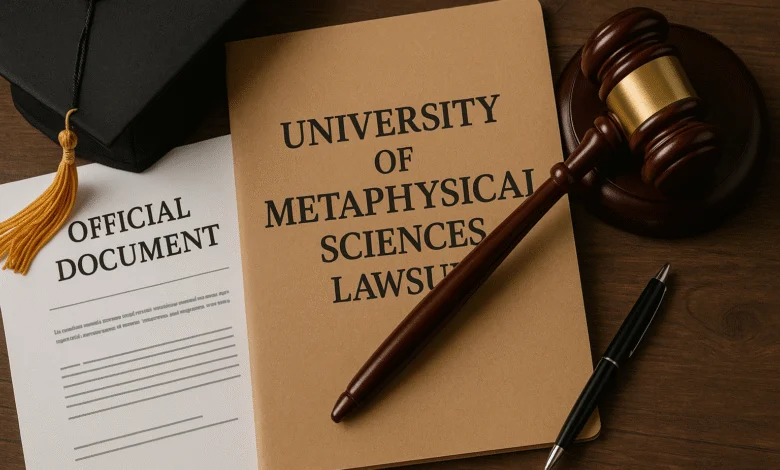University of Metaphysical Sciences Lawsuit: Exposing the Facts Behind the Legal Battle

What Is the University of Metaphysical Sciences?
The University of Metaphysical Sciences (UMS) is an institution offering religious or metaphysical degree programs—focused on spiritual education, consciousness exploration, and metaphysical studies. It operates online and claims accreditation in the context of religious or ministry education, rather than the kinds of accreditation typical of mainstream colleges or universities.
What Sparked the Lawsuit?
The legal dispute involving UMS was initiated by a competitor organization in Sedona, Arizona—International Metaphysical Ministry, Inc. Among the claims was that UMS ran Google advertisements using the competitor’s name, allegedly pointing traffic to UMS’s website in a misleading way. This competitor filed three lawsuits over several years (starting around 2017), making various allegations related to advertising and trademark use.
Key Legal Claims
The core allegations were focussed on misleading advertisement practices: namely, that UMS used Google Ads to trigger competitor’s trademarked terms, causing confusion by funneling searches for the competitor to UMS’s website. There were also accusations tied to false claims about program location (e.g. UMS purportedly being tied to Sedona, Arizona) and questions about whether search terms and social media or SEO tactics had been manipulated.
UMS’s Defense
UMS strongly contested the claims. Their defense included showing Google AdWords reports that allegedly proved UMS never ran ads using the competitor’s trademarked terms. UMS also asserted that much of the negative publicity stemmed from misinformation, fake articles, and what they describe as “predatory litigation” aimed at damaging their reputation. They emphasized that the lawsuit was not about accreditation, curriculum quality, or student grievances, contrary to some articles’ reports.
How the Case Unfolded & Timeline
- 2017–2019: The first lawsuit(s) were filed by the competitor in Sedona, alleging misuse of name/trademark in advertising.
- 2020–2022: More legal maneuvers ensued, including attempts to demand UMS take down its website or limit its ability to advertise. The competitor also claimed false association via manipulated search terms. UMS responded that the evidence was weak.
- 2023–2024: UMS secured summary judgments on several trademark claims, and legal challenges by the competitor lost traction.
- May 12, 2025: The final case – International Metaphysical Ministry, Inc. vs Wisdom of the Heart Church (Wisdom of the Heart Church operating UMS) – was dismissed with prejudice. This means the case is concluded, no liability was found, no settlement paid, and the competitor cannot sue again on the same claims. The trial that had been scheduled for mid-June 2025 was cancelled.
What Was Not Part of the Lawsuit
Some of the rumors and misinformation about the University of Metaphysical Sciences lawsuit have claimed broader issues that were never raised or decided by the courts. These include claims about student academic complaints, financial exploitative practices, design or curriculum errors, and problems with religious degree recognition in secular accreditation systems. These issues were not part of the legal filings against UMS.
Outcome & Legal Status
With the dismissal of the lawsuit on May 12, 2025, UMS effectively cleared itself of the competitor’s claims. Because the case was dismissed with prejudice, the competitor cannot re-file the same claim. There was no financial settlement or court-ordered damages to UMS or the competitor in the resolution.
Impacts on Reputation & Public Perception
Although UMS won the legal battle, the dispute affected its public image. Rumors, fake articles, and misrepresented claims circulated: about accreditation, about legal liability, about student involvement, etc. These appear to have stemmed from what UMS describes as a smear campaign involving manipulated search terms, amplified negative search suggestions, and misleading content across various platforms. These form part of what UMS frames as reputational damage, even though legally dismissed.
What This Means for Students & Prospective Learners
For current and future students of UMS or similar metaphysical/religious institutions, these facts give important takeaways:
- Always verify university accreditation or recognition in relation to your goals—whether spiritual, academic, or professional.
- Be cautious of what you read online—claims about lawsuits or legal trouble can be exaggerated or false.
- Search engine results or Google suggestions may be manipulated or reflect SEO-driven content rather than facts.
- If considering enrollment, ask directly about legal matters, institutional status, and official documentation rather than relying on third-party sources.
Broader Lessons & Legal Considerations
The UMS case highlights legal issues around copy-advertising, trademark infringement, digital marketing, and reputation management. Key lessons include:
- The importance of evidence (e.g. ad reports, trademarks properly owned) in defending digital/trademark claims.
- How litigation can sometimes be used by competitors not always for redress but as a competitive tactic.
- The role of online misinformation, SEO manipulation, and false allegations in shaping public perception, even when legal outcomes favor the defendant.
- Courts’ willingness to dismiss cases when they lack merit, and how the “with prejudice” dismissal protects defendants from being sued again on identical claims.
Final Verdict
The University of Metaphysical Sciences lawsuit was a legal dispute initiated by a competitor focused narrowly on advertising/trademark use—not on student welfare, accreditation, or academic quality. It culminated with a full dismissal with prejudice on May 12, 2025, with no liability or payments required by UMS. Much of the controversy around the case seems rooted in rumors, misleading content, and reputational disputes rather than verified legal findings. For UMS, the legal battle is over—but the efforts to clarify the truth and protect reputation continue.



